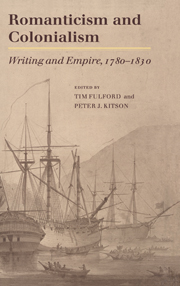Book contents
- Frontmatter
- Contents
- Notes on contributors
- Acknowledgements
- 1 Romanticism and colonialism: texts, contexts, issues
- 2 Romanticism and colonialism: races, places, peoples, 1785–1800
- 3 Romanticism and colonialism: races, places, peoples, 1800–1830
- 4 Accessing India: Orientalism, anti-‘Indianism’ and the rhetoric of Jones and Burke
- 5 ‘Sunshine and Shady Groves’: what Blake's ‘Little Black Boy’ learned from African writers
- 6 Blood Sugar
- 7 ‘Wisely forgetful’: Coleridge and the politics of Pantisocracy
- 8 Darkness visible? Race and representation in Bristol abolitionist poetry, 1770–1810
- 9 Fictional constructions of Liberated Africans: Mary Butt Sherwood
- 10 ‘Wandering through Eblis’; absorption and containment in Romantic exoticism
- 11 The Isle of Devils: The Jamaican journal of M. G. Lewis
- 12 Indian Jugglers: Hazlitt, Romantic Orientalism, and the difference of view
- 13 ‘Some samples of the finest Orientalism’: Byronic Philhellenism and proto-Zionism at the time of the Congress of Vienna
- 14 ‘Once did she hold the gorgeous East in fee…’: Byron's Venice and Oriental Empire
- 15 The plague of imperial desire: Montesquieu, Gibbon, Brougham, and Mary Shelley's The Last Man
- Index
8 - Darkness visible? Race and representation in Bristol abolitionist poetry, 1770–1810
Published online by Cambridge University Press: 20 August 2009
- Frontmatter
- Contents
- Notes on contributors
- Acknowledgements
- 1 Romanticism and colonialism: texts, contexts, issues
- 2 Romanticism and colonialism: races, places, peoples, 1785–1800
- 3 Romanticism and colonialism: races, places, peoples, 1800–1830
- 4 Accessing India: Orientalism, anti-‘Indianism’ and the rhetoric of Jones and Burke
- 5 ‘Sunshine and Shady Groves’: what Blake's ‘Little Black Boy’ learned from African writers
- 6 Blood Sugar
- 7 ‘Wisely forgetful’: Coleridge and the politics of Pantisocracy
- 8 Darkness visible? Race and representation in Bristol abolitionist poetry, 1770–1810
- 9 Fictional constructions of Liberated Africans: Mary Butt Sherwood
- 10 ‘Wandering through Eblis’; absorption and containment in Romantic exoticism
- 11 The Isle of Devils: The Jamaican journal of M. G. Lewis
- 12 Indian Jugglers: Hazlitt, Romantic Orientalism, and the difference of view
- 13 ‘Some samples of the finest Orientalism’: Byronic Philhellenism and proto-Zionism at the time of the Congress of Vienna
- 14 ‘Once did she hold the gorgeous East in fee…’: Byron's Venice and Oriental Empire
- 15 The plague of imperial desire: Montesquieu, Gibbon, Brougham, and Mary Shelley's The Last Man
- Index
Summary
At the very time when Romanticists are at last beginning to address issues of race, particularly the relation between Romantic-era culture and the formation of modern racist categories, ‘race’ has widely come under attack as a viable critical term. Although the debate among theorists and scholars of African-American literature over the status of ‘race’ has been simmering for over a decade now, it has recently received new impetus (and animus) through an exchange in The Black Scholar initiated by Jon Michael Spencer's polemical attack on what he calls ‘the postmodern conspiracy to explode racial identity’. Spencer is responding in part to Kwame Anthony Appiah's critique, developed throughout In My Father's House (1992), of the notion of a ‘racial essence’ as itself implicated in the history of racism and grounded in an ultimately self-defeating ‘biologizing of what is culture, ideology’. The ‘truth is’, Appiah states, ‘that there are no races’. For Spencer, Appiah's position undermines attempts to foster a ‘self-reconciliatory sense of racial pride’ and the ‘quest for racial equity’; for Molefi Kete Asante, it even supports the ‘demonization of African identity’. Walter Benn Michaels extends the debate to take in ‘cultural identity’ and the claims of ‘cultural’ criticism generally, both of which depend, for Michaels, on the ‘earlier notion of racial identity’ deconstructed by Appiah: rather than offering a critique of racism, the ‘modern concept of culture’ is itself ‘a form of racism’.
- Type
- Chapter
- Information
- Romanticism and ColonialismWriting and Empire, 1780–1830, pp. 129 - 147Publisher: Cambridge University PressPrint publication year: 1998
- 5
- Cited by

